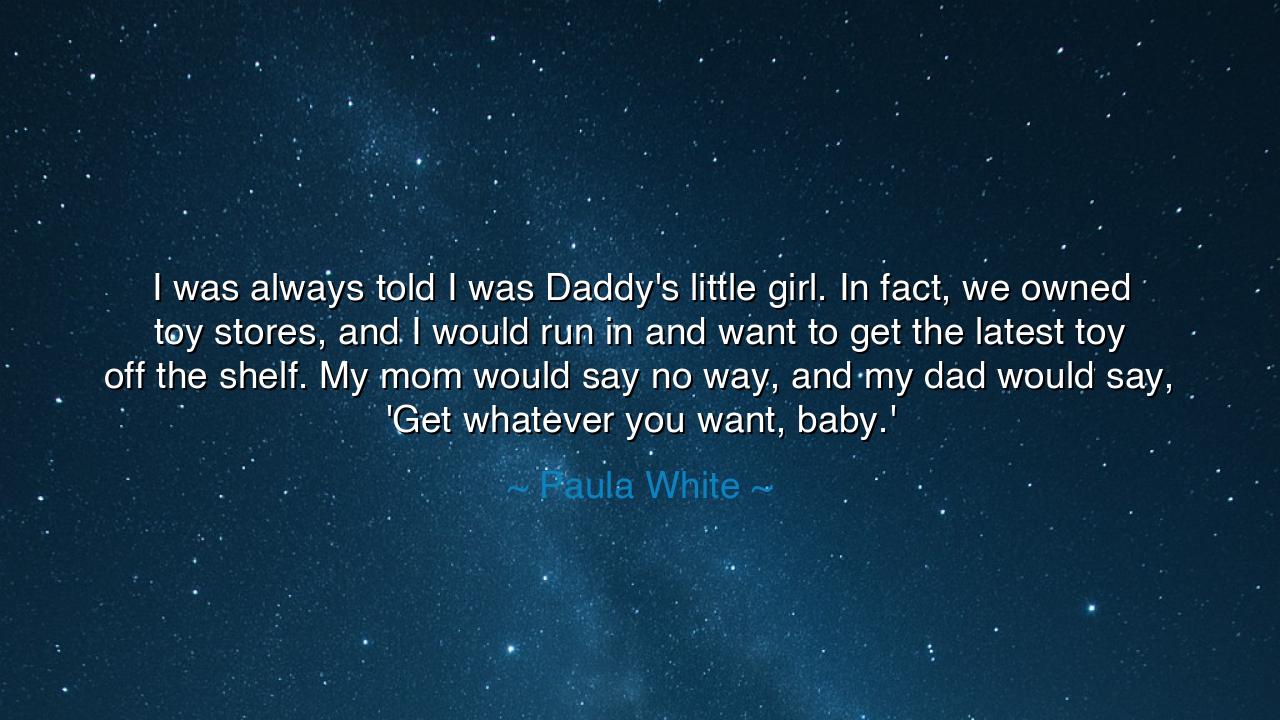
I was always told I was Daddy's little girl. In fact, we owned
I was always told I was Daddy's little girl. In fact, we owned toy stores, and I would run in and want to get the latest toy off the shelf. My mom would say no way, and my dad would say, 'Get whatever you want, baby.'






“I was always told I was Daddy’s little girl. In fact, we owned toy stores, and I would run in and want to get the latest toy off the shelf. My mom would say no way, and my dad would say, ‘Get whatever you want, baby.’” Thus spoke Paula White, the preacher and spiritual leader whose journey from hardship to influence has been marked by both tenderness and trial. Though her words seem to recall a simple childhood memory, within them lies a reflection of the human heart — the way love shapes us, how affection molds our confidence, and how the echoes of our earliest bonds follow us through life. For in the laughter of that child running through aisles of toys, guided by the soft command of her father’s voice, we see the origin of identity, the first whisper of worth that teaches a soul to believe it is seen and loved.
To be called “Daddy’s little girl” is, in its purest sense, to be known — to live under the shelter of unconditional affection. Paula’s memory reveals a sacred balance between authority and grace. The mother, with wisdom and restraint, says, “No way,” teaching the discipline that life demands. The father, overflowing with tenderness, says, “Get whatever you want, baby,” showing the love that life depends upon. Between these two voices — firmness and freedom — the child learns what it means to live fully. She learns to respect boundaries, yet also to believe in her own preciousness. This is the eternal dance of parenthood, the shaping of spirit through both discipline and delight.
This quote also speaks of a deeper truth — that the love of a father or mother is not merely about gifts or indulgence, but about belonging. When Paula remembers her father’s words, she remembers more than the toys he gave her; she remembers the feeling of being cherished, of being someone’s joy. Such affection, when rightly given, becomes the foundation upon which confidence is built. The child who knows she is loved walks into the world not as a beggar seeking approval, but as a soul already filled with worth. She is not easily swayed by rejection or fear, for she carries within her the memory of being valued simply for who she is.
Yet even in such a tender remembrance, there is an undercurrent of fragility. For life does not remain a toy store, and love itself is often tested by time and tragedy. Paula White’s life, as known to the world, would later be marked by loss and perseverance. Her father died when she was still young, and her childhood world, once so filled with warmth, was shadowed by sorrow. Thus, this memory becomes not only a picture of innocence, but a symbol of what sustains us when innocence is gone. The echo of her father’s love — his voice saying, “Get whatever you want, baby” — became for her a living promise: that even in pain, she was still worthy of love, still seen by a Father greater than the one she lost.
In this, her story resembles those of countless souls who have drawn strength from love once given. Consider Helen Keller, who, though deaf and blind, was awakened to the world through the patient affection of her teacher, Anne Sullivan. The tenderness of one human heart can resurrect another from darkness. So too did Paula’s father, through his love, plant in her a faith that would later bear fruit — not in wealth or toys, but in her unshakable belief that compassion transforms all things. When love is planted deeply, it becomes eternal, transcending even death itself.
The lesson, then, is this: love lavishly, but love wisely. Be both the mother who teaches restraint and the father who grants freedom. For every child, every soul, needs both — the grounding of truth and the wings of grace. Love, when balanced between these two poles, produces character that can endure life’s trials without losing joy. And for those who once received such love, never forget its power. Carry it forward. Let the memory of kindness become the source of kindness in you.
And for those who did not have such love, know this: it can still be found. The affection Paula remembers from her father is a reflection of a divine truth — that every human soul is seen, cherished, and called worthy by the Creator of life. Even if earthly voices have been silent or harsh, there is still a greater Voice whispering, “Get whatever you want, child — not in greed, but in grace. Take joy, take peace, take purpose; they are yours.”
So, my children, take this story as a reminder that love is legacy. It does not end in childhood; it echoes across generations. The words you speak today, whether of encouragement or indifference, may become the foundation or the fracture of someone’s spirit. Choose, therefore, to speak as Paula’s father did — words of affirmation that say, “You are worthy, you are seen, you are loved.” For in that love lies the power to shape lives, to heal wounds, and to remind the world that even in its brokenness, the heart still runs — like a little girl through the aisles of life — reaching for wonder, held by love.






AAdministratorAdministrator
Welcome, honored guests. Please leave a comment, we will respond soon